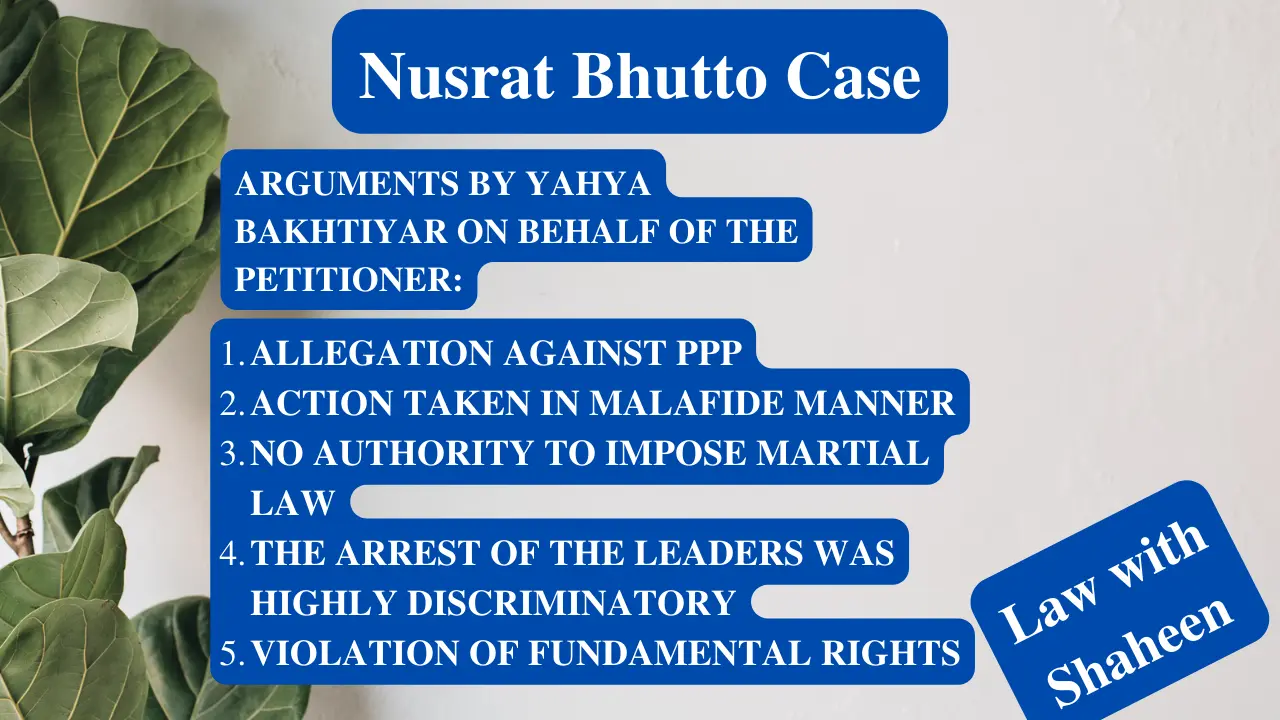Table of Contents
Introduction to Nusrat Bhutto Case:
The judiciary plays a very important role in the interpretation of statutes and laws. The judiciary has a pivotal role in the development of law. It develops law by giving judgments that become precedents. So, precedents may be regarded as a source of law.
In Pakistan too, the superior courts gave judgments that became precedents. There have been a lot of important and leading cases in the history of Pakistan. Begum Nusrat Bhutto v/s Chief of Army Staff and Federation of Pakistan case(nusrat bhutto case) is one of them in which Chief Justice was Anwar-ul-Haq and other judges were Waheed ud Din Ahmad, Muhammad Haleem, Safdar Shah, Muhammad Afzal Cheema, Dorab Petel, Muhammad Akram, Naseem Hassan Shah, and Qaisar Khan.
Facts of Nusrat Case:
Under Article 184 (3) of the Constitution of the Islamic Republic of Pakistan, a petition was filed to challenge the detention of Mr. Zulfiqar Ali Bhutto and ten other leaders of P.P.P. They were detained under Martial Law Order No.12 of 1977. the petition was filed against the Chief of Army Staff and the Federation of Pakistan.
Arguments by Yahya Bakhtiyar On behalf of the Petitioner:
Following were the arguments which were given on behalf of the petitioner:-
(i) Allegation Against PPP:
It was argued that on the evening of 17th September 1977. A public statement was made by the Chief of Army Staff in which he leveled unfair allegations against the PPP Government.
(ii) Action Taken In Malafide Manner:
It was further argued that the action was taken in a mala fide manner, the purpose of which was to prevent the party from taking part in the forthcoming election.
(iii) No Authority to Impose Martial Law:
Mr. Yahya Bakhtiyar argued that the Chief of Staff of the Pakistan Army had no authority to impose martial law in the country.
(iv) The Arrest of the Leaders was Highly Discriminatory:
It was further argued that the arrest and detention of top leaders of the PPP were highly discriminatory and mala fide.
(v) Violation of Fundamental Rights:
The order of detention violated fundamental rights, especially 9,10,17,25
Arguments by A.K.Brohi On behalf of the Federation:
Following were the arguments, those were given by A.K.Brohi on behalf of the federation:-
(i) Objection Against Petition :
(A) Petition Against Chief of Army Staff:
That the petition was directed against the Chief of Army Staff that the detention orders were passed by Chief Martial Law Administrator.
(B) No Violation of Her Fundamental Rights:
The petitioner is not an aggrieved person as she does not allege any violation of her fundamental rights but only those of detenus.
(ii) No Jurisdiction to Court to Grant Relief:
That the Court had no jurisdiction to grant any relief because of the prohibition contained in Article 4,5 of law (Continuous in Force) Order 1977.
(iii) Suspension of Fundament Rights:
Under Article 2(3) of Law (Continuous in Force) Order 1977, the right to enforce fundamental rights was suspended.
(iv) Displacement of Legal Order:
That old legal order was displaced by the new legal order.
(v) Necessity for Imposition of Martial Law:
There was unconstitutional and illegal governance of the country by detenus and terminates on the imposition of Martial Law. There were apprehensions of civil war in the country.
Judgment:
Following was the judgment given by the Supreme Court:
(I) Rectification of Objections:
The objection is only like a technicality. The Chief of Army Staff is also CMLA and the objection could be rectified by adding the words CMLA to the description of respondents as stated in the petition.
(II) Kelsen’s Theory:
The theory of revolution legality can have no application to situations where the breach of legal continuity is admitted to be of a purely temporary nature and for a specified limited purpose. It will be inappropriate to seek to apply Kelsen’s theory to such transient and limited change in the legal continuity of the country thus giving rise to unwarranted consequences of far-reaching character not intended by those responsible for a temporary change.
(III) Failure to Maintain Law and Order:
The Prime Minister faced difficulty in maintaining law and order. There was a political crisis in the country leading to a Constitutional breakdown. A situation had arisen for which the Constitution provided no situation.
It was in these circumstances that Chief of Army Staff General Muhammad Zia-ul-Haq intervened to save the country from chaos and bloodshed to safeguard the integrity of Pakistan and to separate warring factions, which had brought the country to the brink of disaster.
(IV) Extra Constitutional Step:
It was an extra-constitutional step but dictated by the highest consideration of state necessity and the welfare of the people. The declaration of martial law was welcomed by almost all sections of the population, which heaved a sigh of relief after having suffered extreme hardships during the unprecedented disturbance spread over nearly 4 months.
(V) Arrangement of Fair Election:
Chief Martial Law Administrator has stepped in for a temporary period to arrange a fair election.
(VI) Jurisdiction of (Law Continuous in Force) Order:
The Chief Martial Law Administrator was justified in providing in Article 2(3) of Law (Continuous in Force) Order 1977 that the right to enforce fundamental rights shall be suspended.
It is concluded that Martial Law was enforced due to state necessity and for the welfare of the people. The Supreme Court gave a decision in favor of the Federation.
